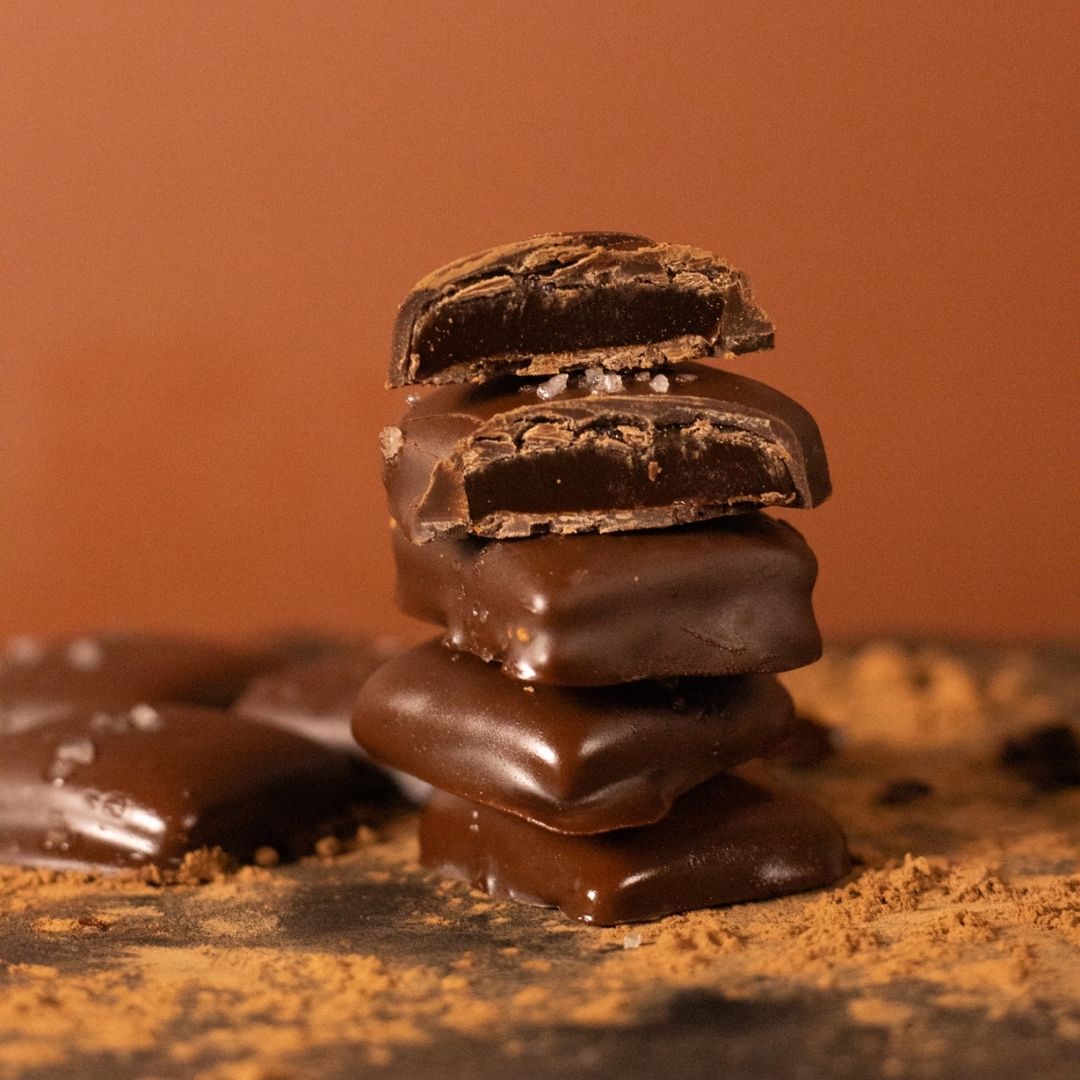Unveiling the Truth: Can Dark Chocolate Really Help You Sleep Better?
Table of Contents:
- Understanding the Link Between Dark Chocolate and Sleep
- Nutritional Content of Dark Chocolate
- How These Components Affect Sleep
- Scientific Research on Dark Chocolate and Sleep
- Studies Supporting Dark Chocolate's Benefits for Sleep
- Counterarguments and Limitations of Studies
- How to Incorporate Dark Chocolate Into Your Nightly Routine
- Best Times to Consume Dark Chocolate for Sleep
- Recommended Amounts and Types
- Potential Side Effects of Dark Chocolate Consumption at Night
- Conclusion
- Frequently Asked Questions
Craving a sweet treat before bedtime? You might be surprised to learn that indulging in a bit of dark chocolate could potentially aid in improving your sleep quality.
Dark chocolate contains a variety of compounds, such as magnesium and serotonin, that are known to promote relaxation and help regulate sleep patterns. In this article, we'll explore the connection between dark chocolate and its potential benefits for a restful night's sleep.
If you've ever wondered whether that square of dark chocolate after dinner could be doing more than just satisfying your sweet tooth, you're not alone.
Many people are curious about the relationship between dark chocolate and sleep. Stay tuned as we delve into the science behind this delicious treat and its impact on your nightly slumber.
Understanding the Link Between Dark Chocolate and Sleep
Dark chocolate may indeed help improve your sleep quality. It contains compounds such as magnesium and serotonin that can promote relaxation and regulate sleep patterns.
Let's delve further into how the nutritional content of dark chocolate and its components affect your sleep.
Nutritional Content of Dark Chocolate
Dark chocolate is rich in various nutrients that can play a role in enhancing sleep quality. Here are some key components found in dark chocolate:
- Magnesium: Dark chocolate is a good source of magnesium, a mineral that has been linked to improved sleep quality. Magnesium helps regulate neurotransmitters involved in sleep and relaxation, such as gamma-aminobutyric acid (GABA) and serotonin.
- Serotonin: Dark chocolate contains serotonin, a neurotransmitter known for its mood-regulating and sleep-promoting properties. Serotonin helps in the production of melatonin, a hormone that regulates the sleep-wake cycle.
- Flavonoids: Dark chocolate is abundant in flavonoids, which are antioxidants that may contribute to overall brain health and circulation. Improved blood flow to the brain can support cognitive function and potentially aid in better sleep.
How These Components Affect Sleep
The components present in dark chocolate can have a direct impact on your sleep patterns:
- Relaxation: Magnesium and serotonin in dark chocolate work synergistically to promote relaxation. Serotonin helps to calm the mind and reduce stress, while magnesium can relax muscles and nerves, contributing to a sense of calm before bedtime.
- Regulation of Sleep Cycles: Serotonin and melatonin production influenced by dark chocolate consumption can help regulate your sleep-wake cycle. By increasing serotonin levels, dark chocolate may assist in promoting sleep onset, while melatonin secretion can enhance the quality of your sleep.
Incorporating moderate amounts of dark chocolate into your evening routine may potentially support a more restful night's sleep by harnessing the beneficial properties of its nutritional components.
Scientific Research on Dark Chocolate and Sleep
Studies Supporting Dark Chocolate's Benefits for Sleep
Research studies have indicated that dark chocolate may indeed have positive effects on your sleep quality. The compounds present in dark chocolate, such as magnesium, serotonin, and flavonoids, play a significant role in promoting relaxation and regulating sleep patterns.
One study published in the "Journal of Proteome Research" found that small amounts of dark chocolate with higher cocoa content could potentially help improve sleep quality by enhancing serotonin levels in the brain.
Counterarguments and Limitations of Studies
While some studies suggest the benefits of dark chocolate for sleep, it's essential to consider the limitations and potential counterarguments.
Excessive consumption of dark chocolate close to bedtime, especially for individuals sensitive to caffeine, may lead to difficulty falling asleep.
Additionally, more robust clinical trials are needed to establish a definitive link between dark chocolate consumption and improved sleep quality.
It's crucial to consume dark chocolate in moderation and consider individual sensitivities to caffeine and other compounds that may affect sleep patterns.
How to Incorporate Dark Chocolate Into Your Nightly Routine
To make the most of incorporating dark chocolate into your nightly routine for better sleep, consider the following recommendations for optimal results.
Best Times to Consume Dark Chocolate for Sleep
Enjoying dark chocolate about an hour before bedtime is ideal. This timing allows your body to benefit from the relaxation-promoting properties of dark chocolate, such as magnesium and serotonin, as you prepare for sleep.
Recommended Amounts and Types
When incorporating dark chocolate into your nightly routine, aim for a moderate serving size, such as a square or two of high-quality dark chocolate.
Opt for dark chocolate with higher cocoa content (70% or more) to maximize the sleep-promoting benefits while minimizing sugar intake.
Remember, moderation is key to reaping the potential sleep-enhancing effects of dark chocolate.
Potential Side Effects of Dark Chocolate Consumption at Night
When considering consuming dark chocolate before bedtime, it's essential to be aware of potential side effects that may affect your sleep.
While dark chocolate offers various benefits, including aiding relaxation and regulating sleep patterns, there are certain drawbacks to be mindful of when incorporating it into your nighttime routine. Here are the potential side effects of consuming dark chocolate at night:
- Caffeine Sensitivity: Dark chocolate contains caffeine, which can be stimulating and may disrupt your ability to fall asleep quickly. If you are sensitive to caffeine, consuming dark chocolate close to bedtime could lead to difficulty in winding down for the night.
- Stimulant Effects: The stimulant properties of dark chocolate, such as theobromine, may increase alertness and make it harder for you to relax and transition into sleep. This can result in a delay in falling asleep or experiencing fragmented sleep throughout the night.
- Acid Reflux: Dark chocolate is known to relax the lower esophageal sphincter, which can lead to acid reflux for some individuals. This can cause discomfort when lying down and may disrupt your sleep by triggering symptoms like heartburn.
- Calorie Intake: While dark chocolate in moderation can be part of a healthy diet, consuming it in large amounts before bedtime may contribute to excess calorie intake, which can impact your overall health and potentially disrupt your sleep patterns.
By being mindful of these potential side effects and adjusting your consumption accordingly, you can still enjoy the benefits of dark chocolate for better sleep without compromising your sleep quality.
It's recommended to consume dark chocolate in moderation and monitor how it personally affects your sleep patterns to find the right balance for a restful night's sleep.
Conclusion
Dark chocolate can indeed be a helpful addition to your bedtime routine for promoting better sleep. Its rich composition of magnesium, serotonin, and flavonoids can aid in relaxation and regulate sleep patterns.
While scientific research supports these benefits, it's important to be mindful of potential side effects like caffeine sensitivity and stimulant effects.
By consuming dark chocolate in moderation and monitoring its impact on your sleep, you can enjoy its positive effects without compromising your rest.
Remember to adjust your consumption based on personal tolerance levels and be cautious of any adverse reactions. Overall, incorporating dark chocolate into your evening ritual can be a delicious way to enhance your sleep quality.
Frequently Asked Questions
Is consuming dark chocolate before bedtime beneficial for sleep?
Yes, consuming dark chocolate before bedtime can improve sleep quality. Dark chocolate contains compounds like magnesium, serotonin, and flavonoids that aid in relaxation and regulate sleep patterns.
What scientific evidence supports the positive effects of dark chocolate on sleep?
Scientific research has shown that dark chocolate can positively impact sleep, particularly by increasing serotonin levels, which contribute to relaxation and improved sleep quality.
Are there any potential side effects of consuming dark chocolate at night?
Yes, potential side effects of consuming dark chocolate at night include caffeine sensitivity, stimulant effects, acid reflux, and concerns about calorie intake. It is important to be aware of these drawbacks and adjust consumption accordingly.
How should individuals consume dark chocolate for better sleep?
Individuals should consume dark chocolate in moderation and monitor its effects on their sleep patterns to achieve a restful night's sleep. Being mindful of portion sizes and timing can help enjoy the benefits without compromising sleep quality.

